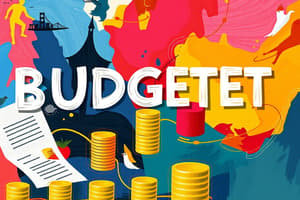Podcast
Questions and Answers
Which of the following best describes the primary difference between a budget and a forecast?
Which of the following best describes the primary difference between a budget and a forecast?
- A budget is a prediction, whereas a forecast is a planned outcome.
- A budget is used by large businesses, whereas a forecast is used by small businesses. (correct)
- A budget is a planned outcome, whereas a forecast is a prediction.
- A budget is based on objectives, whereas a forecast is based on subjective opinions.
Most budgets are set for a period of 6 months to align with the accounting period.
Most budgets are set for a period of 6 months to align with the accounting period.
False (B)
What is one way that budgeting helps managers improve coordination within a company?
What is one way that budgeting helps managers improve coordination within a company?
Budgeting aligns activities across different areas of the business.
Budgeting removes an element of __________ within decision-making throughout the business.
Budgeting removes an element of __________ within decision-making throughout the business.
How does budgeting contribute to the efficiency of a business with many workers?
How does budgeting contribute to the efficiency of a business with many workers?
Budgeting primarily serves to restrict management's ability to respond quickly to problems.
Budgeting primarily serves to restrict management's ability to respond quickly to problems.
What is one way that budgeting can act as a motivator for the workforce?
What is one way that budgeting can act as a motivator for the workforce?
Improving on the budget position is an indication of __________ for a department or group of workers.
Improving on the budget position is an indication of __________ for a department or group of workers.
Which of the following is a key type of budget frequently used by businesses?
Which of the following is a key type of budget frequently used by businesses?
Budgets are always prepared using current market data to ensure accuracy.
Budgets are always prepared using current market data to ensure accuracy.
What type of data is used to prepare budgets?
What type of data is used to prepare budgets?
In zero-based budgeting (ZBB), a manager must show that a particular item of spending generates an adequate amount of __________ in relation to the general objectives of the business.
In zero-based budgeting (ZBB), a manager must show that a particular item of spending generates an adequate amount of __________ in relation to the general objectives of the business.
How does zero-based budgeting (ZBB) differ from traditional budgeting approaches?
How does zero-based budgeting (ZBB) differ from traditional budgeting approaches?
Zero-based budgeting always increases staff motivation because it simplifies the evaluation process.
Zero-based budgeting always increases staff motivation because it simplifies the evaluation process.
Match the advantages of Zero-Based Budgeting (ZBB) with their description:
Match the advantages of Zero-Based Budgeting (ZBB) with their description:
Flashcards
What is a budget?
What is a budget?
A financial plan agreed in advance, showing money needed for spending and financing.
How do budgets control a business?
How do budgets control a business?
Setting objectives and targets, then comparing actual results to the budget.
Budgeting: Planning Function
Budgeting: Planning Function
Thinking ahead, anticipating problems, and planning solutions.
Budgeting: Co-ordination Function
Budgeting: Co-ordination Function
Signup and view all the flashcards
How can budgeting motivate?
How can budgeting motivate?
Signup and view all the flashcards
Key Budget Types
Key Budget Types
Signup and view all the flashcards
Historical Figures in Budgeting
Historical Figures in Budgeting
Signup and view all the flashcards
Zero-Based Budgeting (ZBB)
Zero-Based Budgeting (ZBB)
Signup and view all the flashcards
Advantages of Zero-Based Budgeting
Advantages of Zero-Based Budgeting
Signup and view all the flashcards
Disadvantages of Zero-Based Budgeting
Disadvantages of Zero-Based Budgeting
Signup and view all the flashcards
Study Notes
- A budget represents a financial plan agreed upon in advance
- It differs from a forecast, as a budget is a planned outcome, while a forecast predicts future events
- Budgets outline necessary spending and financing methods and are rooted in business objectives
- They compel managers to plan ahead, improving coordination, and are typically set for 12-month accounting periods
- Both large and small businesses can utilize budgets, with small business owners sometimes underestimating their importance for financial control
- Budgets facilitate management's control of the business through clearly defined objectives and targets
Planning
- Budgeting makes management plan ahead
- Without budgeting, managers might only react to immediate issues
- Budgeting, however, plans for the future anticipating problems and solutions
Co-ordination
- Budgeting coordinates and controls activities across various business areas, especially in larger, complex organizations with multiple departments and sites
- It is crucial for multinational companies with globally dispersed sites and employees
Communication
- Budgeting communicates business objectives to the workforce
- By adhering to a budget, managers and workers operate within a clear framework, reducing uncertainty in decision-making
- Budgets highlight business priorities and essential costs to control
Efficiency
- Budgeting is very efficient
- It is important to empower staff through delegated decision making, particularly in businesses with many workers
- Budgets provide financial control to lower management levels, enabling informed decision-making within the organization
Motivation
- Budgeting motivates the workforce by setting targets and standards
- Exceeding the budget indicates success for departments or teams
- Fear of not meeting targets can motivate workers
Types of Budget
- Businesses use various budget types, sales and production cost budgets being the most common
- Budgets often originate from historical data, which means the data used to prepare the budgets is based on data that the business has gathered in the past
- Adjustments are made for future events like planned changes in production, costs, or prices
Zero-Based Budget (ZBB)
-
Zero-based budgeting allocates money to costs that can be justified
-
Differs from using historical data with adjustments and requires managers to demonstrate how spending benefits business objectives to get budget allocation
-
It evaluates costs regularly to cut unnecessary purchases and links to opportunity cost, aiming to minimize it by spending cautiously while ensuring 'value for money'
-
ZBB advantages:
- Improved resource allocation via a questioning attitude to cut costs
- Enhanced staff motivation by practicing evaluation skills and gaining firmer operation knowledge
- Promotes looking for other options
-
ZBB disadvantages:
- It is time consuming because of detailed data collection and analysis for spending decisions
- Requires skillful decision-making, which might be lacking
- Decisions can be subjective and threaten existing operations, potentially affecting motivation
-
To address ZBB challenges, businesses can set a base budget (e.g., 50%) and invite departments to bid for additional funds on a ZBB basis
Studying That Suits You
Use AI to generate personalized quizzes and flashcards to suit your learning preferences.




